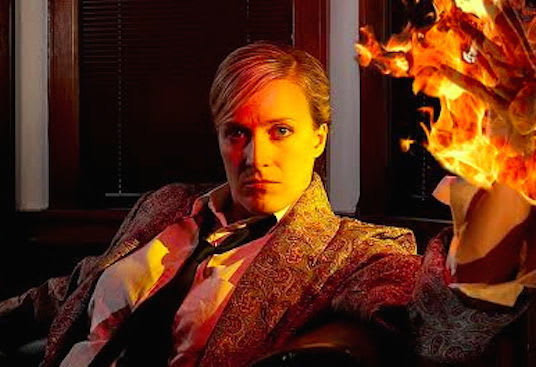A visit by Canadian actor and dramatist Margo McDonald to London provided a one-off opportunity to see her appear in her own play about American theatre legend British-born Eva Le Gallienne.
In a 75-minute duologue, which won awards for its Canadian première production, MacDonald concentrates on the famous lesbian actress’s relationship with one particular lover, younger actress Josephine Hutchinson, played for this performance by Jessica Ruano.
Hutchinson, daughter of an actress and already in silent movies when she was a child, joined Le Gallienne’s Civic Repertory Company in 1926 when she was 23 and already married to stage director Robert Bell. This play traces the period from then until after Josephine’s second marriage in 1935, a period which saw Le Gallienne effectively outed as lesbian, to those who recognized the implication, when a newspaper reporting Josephine’s divorce in 1930 referred to her as Eva’s “shadow”.
Both women’s careers survived the exposure but Le Gallienne’s was tragically interrupted when a boiler explosion at her country home scarred her face and burned her hands causing serious damage. The subsequent stress was often relieved by recourse to the bottle.
The play doesn’t proceed chronologically (though post-fire scenes are identified by Le Gallienne stretching to exercise her deformed fingers) and scenes from some of the plays in which she performed are used to reflect relations between the two women. It opens with one of them, discussing their relationship as Josephine in the shadows reads from a playscript as Eva in wig and period dress plays her role.
Elsewhere, Peter Pan (a role for which Eva was acclaimed) is seen coaxing Wendy to fly away with him, paralleling Eva’s suggestion that Jo move in with her; Lewis Carroll’s Alice (played by Jo with the Civic Repertory) caught up in a scene of confusion that reflects Jo’s exasperation and Ophelia’s parting from Hamlet (who Eva played in 1937 with a teenage Uta Hagen as her Ophelia) presages break-up.
That opening scene (from Hedda Gabler) is turgidly translated and seems to portend a terrible evening but makes its point when, in a rapid transformation, the actress jettisons her wig to reveal a masculine crop and throws off her dress to struggle into trousers. It's a quick change that gets repeated as Le Gallienne switches from private self to public persona.
“A young girl should be tempted to taste a forbidden world,” says this Eva, who had already had a Hollywood affair with Nazimova and (among others) poet and playwright Mercedes de Acosta. When she invites another young actress into the company and into their home, Jo’s caring devotion is challenged, the relationship begins to unravel and Jo finds her career moving to the West Coast. MacDonald makes Le Gallienne’s response highly histrionic but it works as the response of an actress exploding with a partly self-dramatised emotion.
Set against Jessica Ruano’s gentle Josephine, who gave up her marriage to be with her, MacDonald suggests a woman with an inner insecurity behind the confident displays of affection and the bold front she puts up to the world.
Shadows gives just a glimpse into a woman who tried to change things in American theatre. The Depression killed off the Civic Repertory during the period with which this play deals but she tried again in the 1940s with the American Repertory Theater, set up in association with producer Cheryl Crawford and the British director Margaret (Peggy) Webster, with whom Le Gallienne had another long-term affair.
Though this compact work is complete within its own parameters, this production directed by Amy Stratton makes one want to have more.
